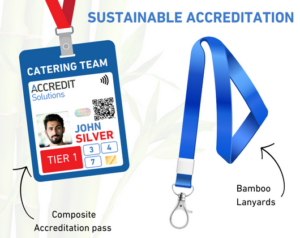In the continuous journey towards sustainability, every material and process choice matters, especially in sectors like event management, which traditionally generate significant waste.
Following our exploration of eco-friendly accreditation badges and associated processes, this blog post delves into the world of bamboo lanyards, composite accreditation cards, sustainable wristbands, and recyclable passes innovative alternatives that can greatly reduce the environmental impact of major events.
Bamboo Lanyards: A Greener Alternative
Bamboo is swiftly becoming a favourite material in the sustainable products space, and for good reason. As one of the fastest-growing plants on Earth, bamboo is an incredibly renewable resource. It requires no fertilizer and regenerates from its own roots, so it doesn’t need to be replanted. When used to make lanyards, bamboo offers a durable, biodegradable option that stands in stark contrast to the synthetic materials commonly used.
Bamboo lanyards are not only environmentally friendly but also skin-friendly, offering a soft, breathable material that is comfortable to wear—ideal for long events. They can be naturally dyed with eco-friendly inks to feature any company logo or event detail, ensuring that branding needs are met without compromising on ecological values.
Composite Accreditation Cards: Smart and Sustainable
Moving on to accreditation cards, a shift from traditional plastic cards to composite materials can significantly reduce plastic waste. The composite cards are made from a combination of recycled plastics and other recycled materials, reducing the use of virgin plastics.
These cards are designed to be durable yet easily recyclable at the end of their life cycle, supporting the principles of the circular economy. Moreover, they can be equipped with smart technologies, such as RFID chips, to enhance user experience while maintaining eco-friendly standards. This smart integration allows for a seamless and modern approach to accreditation management, aligning with digital trends and sustainability.
Adding RFID chips to these cards does not detract from their sustainability. In fact, using sustainable materials for RFID components, such as recyclable plastics or biodegradable elements, further promotes environmental responsibility. The cards’ reusability reduces waste, and there are several options for recycling these electronic components:
Collection Programs: Participating in specialised e-waste recycling programs or drop-off points that accept electronic cards ensures they are processed correctly.
Manufacturer Take-Back: Some manufacturers offer take-back programs for their products, ensuring proper recycling.
Sustainable Wristbands: Eco-Friendly Access
Wristbands are a common accessory for event access and attendee identification. Traditionally made from synthetic materials, wristbands contribute significantly to plastic waste. However, sustainable alternatives are now available, offering eco-friendly options without compromising functionality.
Eco-Friendly Materials: Sustainable wristbands can be made from materials like organic cotton, bamboo fabric, or recycled PET plastic. These materials are biodegradable or recyclable, significantly reducing their environmental footprint.
Reusable Designs: Some sustainable wristbands are designed to be reusable, allowing event organizers to collect and reuse them for future events. This approach not only reduces waste but also offers a cost-effective solution in the long term.
Customisation with Eco-Friendly Inks: Just like bamboo lanyards, sustainable wristbands can be customised using eco-friendly inks. This ensures that branding and event details are prominently displayed without harmful environmental effects.
Recyclable Passes: Reducing Waste
Event passes are another area where sustainable practices can make a significant impact. Traditional plastic passes can be replaced with recyclable alternatives that align with environmental goals.
Materials: Recyclable passes are often made from materials like paper, cardboard, or biodegradable plastics. These passes are designed to be recycled after use, reducing the amount of waste sent to landfills – see our previous blog on recyclable materials with the FSC logo!
Durability and Design: Despite being recyclable, these passes are durable and can withstand the wear and tear of event usage. They can be printed with vibrant colors and detailed designs, ensuring they meet aesthetic and functional needs.
Why Make the Switch?
The benefits of switching to bamboo lanyards, composite cards, sustainable wristbands, and recyclable passes extend beyond environmental impact. Sustainable practices often lead to cost efficiencies in the long run, reduced waste, the reuse of materials, and the positive public perception of green initiatives.
As we continue our series on sustainable solutions, it’s clear that small changes can lead to significant impacts. By adopting these innovations, event organisers can contribute to a more sustainable planet while enhancing their operational efficiency.
Stay tuned for more insights into sustainable practices and how you can implement them in your accreditation practices at your events!
Time to talk?
Get in touch if you are interested in talking all things accreditation – info@accredit-solutions.com






![EAS-Accredit-300dpi[22]](https://www.accredit-solutions.com/wp-content/uploads/2024/01/EAS-Accredit-300dpi22-300x156.png)

